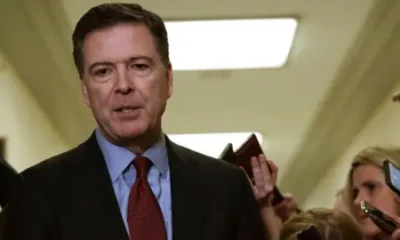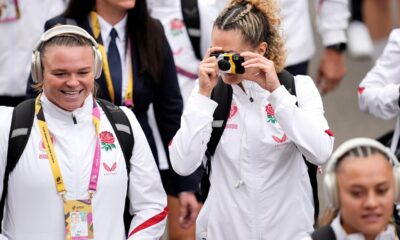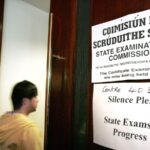Business
Chris Mason: Starmer’s irritation with Burnham shows as he seeks to tackle critics
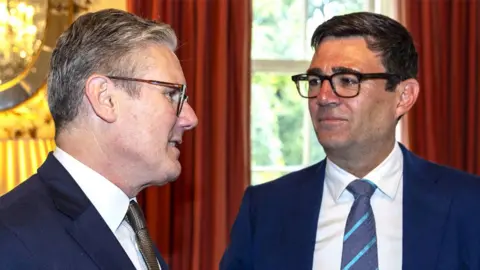
Read full article on post.
Chris MasonPolitical editor
The prime minister will address a conference of centre-left leaders from around the world on Friday and argue it is time to “look ourselves in the mirror and recognise where we’ve allowed our parties to shy away from people’s concerns.”
A key theme of the Global Progressive Action Conference is about how the Labour Party and its sister outfits around the world take on Reform UK and their equivalents.
“This is the defining political choice of our times: a politics of predatory grievance, preying on the problems of working people… against the politics of patriotic renewal,” Sir Keir Starmer will claim.
And it is this challenge that unites the two big things in politics in the last 48 hours.
First there was the blizzard of headlines about the Mayor of Greater Manchester, Andy Burnham.
Then, conveniently timed, the blizzard of headlines yesterday afternoon about the government’s plans for compulsory digital ID.
This, yes, is the daily din of Westminster, but there is a signal amid the noise.
Personnel, policy and ambitions are all in the mix here, three of the staples of politics, but they are also both a symptom of the same thing: a party and a movement wrestling with how to confront what senior figures agree is a generational challenge – the rise of Reform UK.
This, for so many Labour folk, is not merely the traditional political tussle with the party’s oldest adversary, the Conservatives.
Instead, it is an insurgency which utterly horrifies so many of them.
It is Reform’s recent rise – and the durability of its support, up to now at least – that has fast forwarded the collywobbles in a vast parliamentary Labour Party so soon after a general election.
Of all the criticisms of Sir Keir, there is one that has stuck, almost to the point of cliche, and is acknowledged as being fair within government and beyond.
It is the persistent critique that there has long been a lack of definition about the government’s direction.
And it is into this perceived vacuum that Andy Burnham has stridden, again, to the intense irritation of Downing Street and plenty of Labour MPs.
I know what Labour should stand for and I’d know how I’d communicate it is the underlying message from Manchester, with the implication the prime minister isn’t doing either.
Sir Keir may not strike you as the kind of bloke to be frequently demonstrably angry or irritated.
But when a Labour prime minister compares a Labour colleague to former Conservative Prime Minister Liz Truss, you know just how narked he is by the whole thing.
The prime minister and those around him have long privately rolled their eyes at Burnham’s antics.
But when Sir Keir invokes the memory of a prime minister associated with economic calamity and near immediate political oblivion – and, on top of that, suggests his economic prospectus could lead to the same outcomes – you know he isn’t messing about.
Incidentally, the scale of the backlash from Labour MPs to Burnham’s interviews was quite the thing to witness.
Burnham has his supporters in the Parliamentary Labour Party, but boy, plenty told us he should just shut up.
And amid all this comes the crucial new detail about a plan the prime minister has talked up enthusiastically in recent weeks – digital ID.
The new key point – it will be compulsory.
Sir Keir will talk about the idea in his speech at a gathering also attended by Anthony Albanese, the prime minister of Australia, and Canadian Prime Minister Mark Carney.
He hopes it is a practical example of how he can give definition to his premiership, have what he hopes is a useful tool in tackling illegal working and therefore illegal immigration, and give himself a useful political dividing line with his opponents.
Reform UK, the Liberal Democrats and the Scottish National Party are opposed to the plan.
The Conservative position is more ambiguous. They see it for now at least as a “desperate gimmick” but do remain open to being persuaded it is a good idea.
Is it something he can lean into as a defining idea of his time in office and help him address the predicament he and his party find themselves in? He has to hope so.
Business
Former FBI director James Comey indicted on two charges
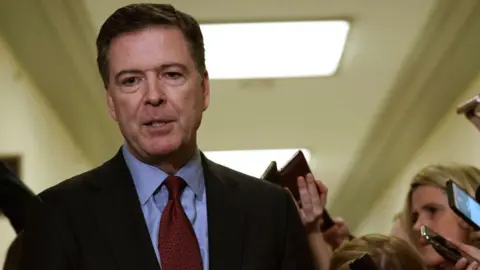
Read full article on post.
Ali Abbas Ahmadi and
Max Matza
A federal grand jury in the US state of Virginia has indicted former FBI Director James Comey on two charges related to his testimony to Congress.
Mr Comey, who has long drawn US President Donald Trump’s criticism, is accused of lying to Congress during his September 2020 testimony over whether he authorised the leak of classified information to the media.
Responding to the indictment, Mr Comey declared himself innocent and said he had “great confidence in the federal judicial system”.
The indictment comes days after Trump called on the country’s top law enforcement official, Attorney General Pam Bondi, to more aggressively investigate his political adversaries, including Mr Comey.
The probe is being led by Lindsey Halligan, the US Attorney for the Eastern District of Virginia, who was previously Trump’s personal lawyer and took over her new role on Monday.
Mr Comey’s arraignment – where charges are formally read out in front of a defendant in court – has been set for the morning of 9 October in Alexandria, Virginia at 10:00 local time (14:00 GMT), the BBC’s US partner CBS reports.
Bondi said in a statement that the indictment “reflects this Department of Justice’s commitment to holding those who abuse positions of power accountable for misleading the American people”.
Mr Comey has been charged with one count of making false statements and another of obstruction of justice.
The alleged false statements relate to telling a senator on the Senate Judiciary Committee that he had not “authorized someone else at the FBI to be an anonymous source in news reports” regarding an FBI investigation, presumed to be the inquiry into whether Russia meddled with the 2016 election.
The second count of obstruction alleges that Mr Comey “did corruptly endeavor to influence, obstruct and impede the due and proper exercise of the power of inquiry under which an investigation was being had before the Senate Judiciary Committee by making false and misleading statements” before that committee.
The Justice Department asked the grand jury to consider three charges against Mr Comey, but it could only agree that two of them were backed by enough evidence to be tried in court.
The third count was another charge of making false statements.
A grand jury is a group of citizens set up by a prosecutor to determine whether there is enough evidence for charges to be filed. In legal terms, it determines whether probable cause exists to believe a crime has been committed.
Mr Comey is the first ex-FBI director to be indicted for a crime, and he maintains that he has not lied under oath.
If found guilty, he could face up to five years in prison.
A lawyer for Mr Comey, Patrick Fitzgerald, issued a short staying saying his client denied the charges, adding: “We look forward to vindicating him in the courtroom.”
Mr Comey said in a separate video statement: “My family and I have known for years that there are costs to standing up to Donald Trump.”
“We will not live on our knees, and you shouldn’t either,” he continued, adding: “And, I am innocent. So, let’s have a trial.”
The charges were filed shortly before the five-year statute of limitations was set to expire on Tuesday.
The case had recently been handed over to a new prosecutor after Erik Seibert, the original US attorney overseeing the case, was fired by the Trump administration. He was replaced by Ms Halligan.
According to charging documents, Mr Comey “did willfully and knowingly make a materially false, fictitious, and fraudulent statement… by falsely stating to a US Senator” that he had not “authorised someone else at the FBI to be an anonymous source in news reports”.
Prosecutors say the statement was false, as Mr Comey had directed an unnamed person “to serve as an anonymous source in news reports regarding an FBI investigation concerning” another unnamed person.
Around 30 September 2020, the document states, Mr Comey “did corruptly endeavor to influence, obstruct and impede the due and proper exercise of the power of the inquiry” of the US Senate Judiciary Committee through “false and misleading statements”.
The case is considered to be the highest-profile indictments of a public figure during Trump’s second term.
Trump recently voiced his frustration that prosecutions of his public critics such as Mr Comey, Senator Adam Schiff and New York Attorney General Leticia James are taking so long.
“We can’t delay any longer, it’s killing our reputation and credibility. They impeached me twice, and indicted me (5 times!), OVER NOTHING. JUSTICE MUST BE SERVED, NOW!!!” Trump said on Truth Social last week.
After charges were filed, Trump called Mr Comey “one of the worst human beings this Country has ever been exposed to”.
“He has been so bad for our Country, for so long, and is now at the beginning of being held responsible for his crimes against our Nation. MAKE AMERICA GREAT AGAIN!”
Asked about Mr Comey hours before the indictment was unsealed, Trump called him a “bad person” but said he had no advanced knowledge of his prosecution.
Laurie Levenson, a former federal prosecutor and a law professor at Loyola Marymount University, said it will be a very challenging case to prosecute.
“It’s often the defendant’s word against someone else’s and you’re gonna have to look at the credibility of both,” she tells BBC News.
“And even if James Comey got things wrong, that doesn’t mean that he knowingly or intentionally lied to Congress. So proving that is going to be the heart of the case.”
Ms Levenson also said this prosecution and Trump’s public pressure to move forward on it suggests that the traditional firewall between the White House and the US Department of Justice had “collapsed with this case”.
Several Democrats condemned the charges, with House Democratic Leader Hakeem Jeffries denouncing them as “a disgraceful attack on the rule of law”, and vowing “accountability” for “anyone complicit in this malignant corruption”.
Mr Comey served as the FBI’s director between 2013 and 2017.
He had a tumultuous tenure that included overseeing the high-profile inquiry into Democratic candidate Hillary Clinton’s email just weeks before the 2016 election, which she lost to Trump.
He was fired by Trump amid an investigation into Russian interference in the 2016 election.
This is not the first investigation into the former FBI boss to be launched this year.
He was investigated by the Secret Service after he shared and then deleted a social media post of seashells spelled the numbers “8647”, which Republicans alleged was an incitement to violence against US President Donald Trump.
The number 86 is a slang term whose definitions include “to reject” or “to get rid of”, according to the Merriam-Webster dictionary, which also notes that it has more recently been used as a term meaning “to kill”, while Trump is the 47th US president.
In July, Mr Comey’s daughter Maurene Comey was fired from her role as a federal prosecutor in the Southern District of New York. She was given no reason for being removed from the office where she had worked for 10 years, according to media reports.
Earlier this month, she sued the Trump administration over her dismissal.
The Justice Department has been firing lawyers who worked on cases that angered the president, including a special prosecutor investigation of Trump.
Additional reporting by Sumi Somaskanda
Breaking News
School scanners for pupils thought to have weapons

Read more on post.
Anna LewisBBC Wales
Handheld scanners will be used to search children suspected of having a weapon in Cardiff schools under new guidance.
The guidelines, which are thought to be the first of their kind in Wales, deal with what happens when a child is thought to be carrying a weapon, and the next steps if one is found.
Cardiff council said it had been designed after calls by head teachers for up-to-date advice to keep students and staff safe, following growing concerns about knife crime in schools.
Sarah Merry, the council’s cabinet member for education, said while she understood parents “may feel anxious about the idea of searches”, they would not be part of a daily school routine or “done lightly”.
In 2013, the Welsh government introduced a power which allowed schools in Wales to screen pupils for a knife or other weapons, and to search pupils suspected of carrying a weapon.
New guidance sent to parents in Cardiff states a search may be necessary if staff have a “reasonable” suspicion that a young person has a weapon in school.
During a search, it added two members of staff would be present, and that in most cases a “search wand” would be used to remove any physical contact.
“Parents or carers will be informed following a search and the reasons for the search will be explained,” the guidance adds, with the purpose of the search also explained to the student.
Under the guidelines, if a weapon is found then an incident review meeting should be arranged within five school days of the incident with “at least one daily welfare check”.
The young person should not be allowed to go to school until this meeting has taken place, while a “trauma-informed investigation” would then take place to understand why the young people brought the weapon into school and the next steps that should be taken.
According to Cardiff council, the guidelines recognise “there are often complex reasons why a young person might carry a weapon” and encourages schools to work with families and other services so support can be put in place.
The guidelines have been rolled out to all primary, secondary and special schools after being developed through consultation with children, and co-produced with partners including South Wales Police, youth services and violence prevention experts.
Merry, who is also council deputy leader, said: “Head teachers have been asking for revised support in this area and it’s absolutely right that we’ve worked closely with them to create something practical and useful.
“It is also part of our review following incidents in other parts of the country and gives schools the tools they need to keep everyone safe – it’s not about creating fear; it’s about building confidence.”
As well as guidance on weapons, each school in Cardiff has appointed a violence prevention lead, who are senior staff members that will take part in specialist training to prepare them for real-life situations involving weapons or threats to safety.
Other actions taken to keep schools safe include lockdown rehearsals to help schools prepare for emergencies, and using the curriculum to “build a culture of respect and safety”.
Business
Dahl, Torres and ‘Keighley Queens’ – the making of Kildunne
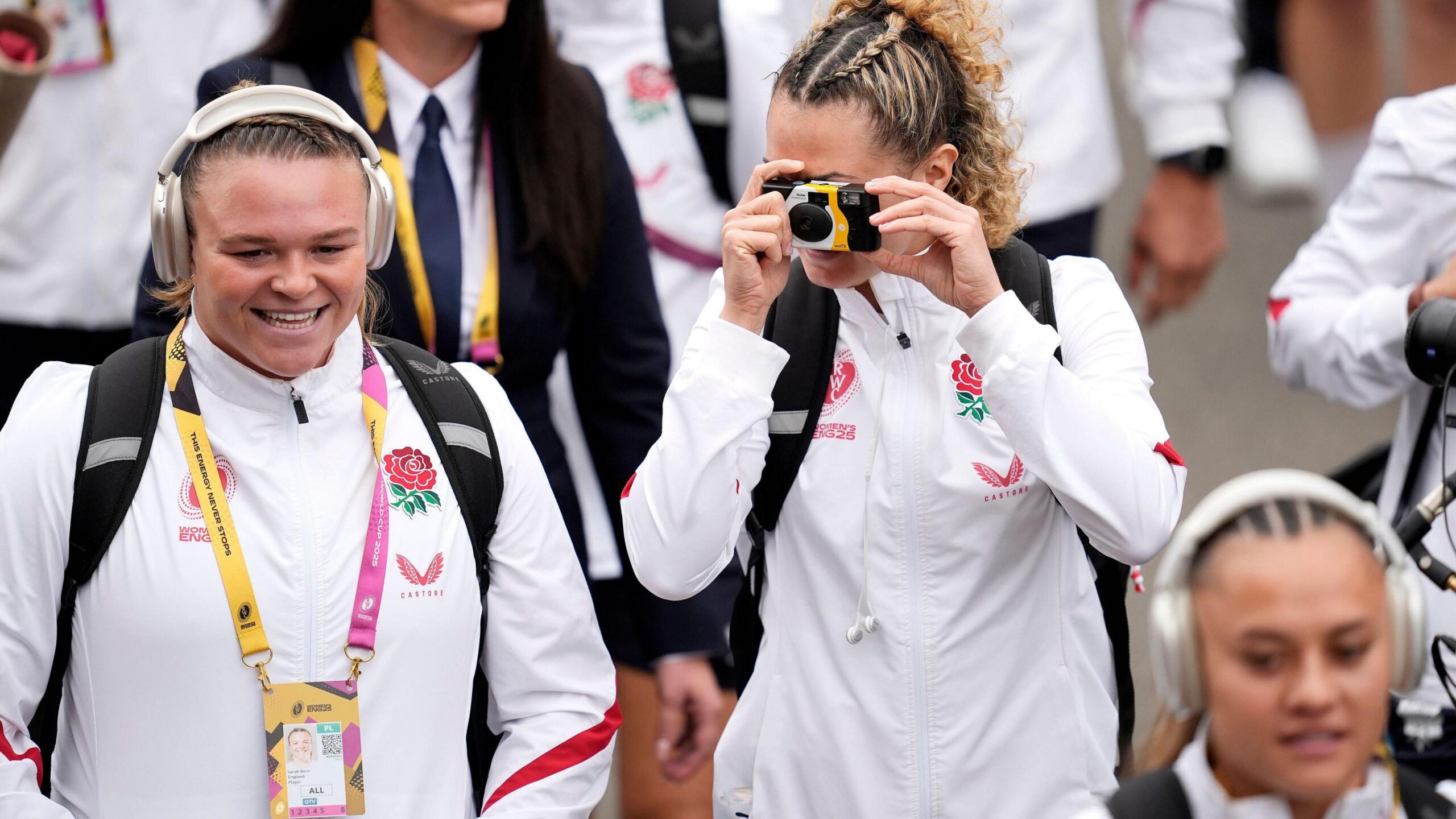
Read full article on post.
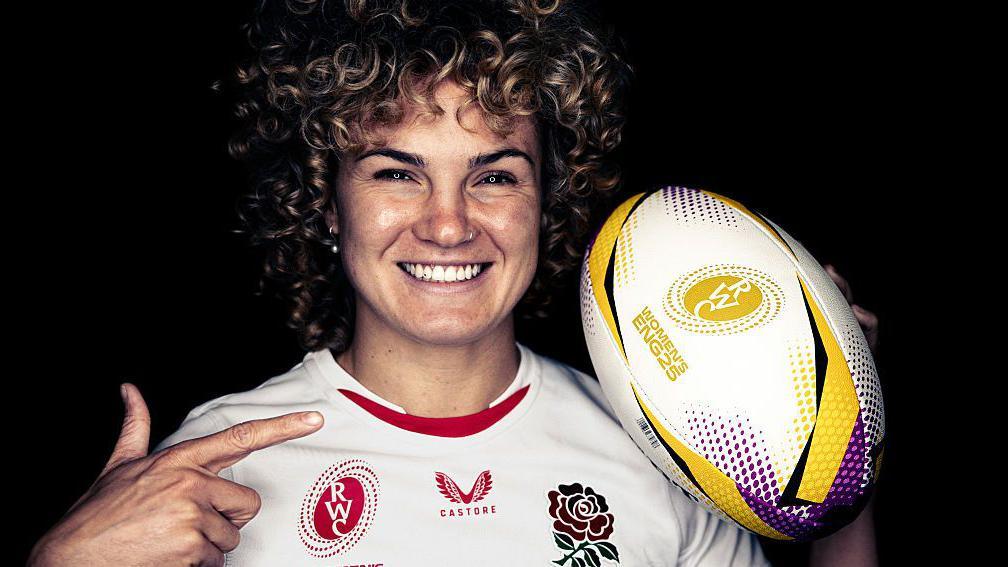 Getty Images
Getty Images-
31 minutes ago
The pivotal team in Ellie Kildunne’s journey doesn’t exist.
Even the star herself can’t quite remember what they were called. Or more accurately, what she called them.
“Keighley Queens” is her best guess.
Kildunne had turned up at a trial for Yorkshire’s under-15s side. She hadn’t been invited, but her mother spotted the date and took her along.
Asked which team she played for, a club-less Kildunne had to improvise. The Keighley Queens, or something similar, were born.
Kildunne had previously had two clubs.
Having tagged along with her neighbours’ two boys at the age of six, she would cross town and codes to play both league for Keighley Albion and union for Keighley on weekends.
The only girl on the pitch, she would scorch past once-scornful boys.
“I just loved the pressure of proving myself,” she remembers.
“I wanted to make a statement. ‘You are looking over your shoulder and laughing, but just wait…'”
She had overturned similar preconceptions at secondary school. Arriving as an 11-year-old, she told the PE staff she would be playing rugby, not netball.
She was shoved out on the wing for the B team. By the end of the season, she was named back of the year.
But her progress hit a familiar roadblock. Puberty hit, genders split, teams expanded to 15 players and rugby options for young women grew sparse.
“I didn’t know that women’s rugby was a big thing at that point,” says Kildunne.
“Instead I wanted to be the next Steven Gerrard.”
To play this video you need to enable JavaScript in your browser.
This video can not be played
By the time Kildunne arrived at that Yorkshire trial, she had moved on to football.
A childhood Liverpool fan, she used to run around the house in a replica shirt, her curly hair slicked back to resemble Spanish striker Fernando Torres.
It provided the team environment she relished.
She was part of a Farsley Celtic team who travelled to Manchester City’s Etihad training campus and beat the Premier League giant’s academy side 7-1.
But Kildunne still hungered for rugby.
“When you’ve got that feeling inside you that you’re meant to do something special, you have to have that dedication and drive to overcome barriers,” she said.
“There’s always another route. If it’s not A, B or C, it’s probably X, Y, Z.”
For Kildunne, it was Yorkshire. Having been accepted to represent her county, she thought she had better find a real club to replace ‘Keighley Queens’.
She joined West Park Leeds. Soon after she played Castleford. On the opposite team was Carla Middleton, the daughter of future Red Roses coach Simon Middleton.
“I’d never seen anything like it,” said Middleton Sr.
“Her team went 30 points down and she kept them in it, almost on her own, running in tries and kicking goals from the touchline. You don’t see that from many 15-year-olds.”
Three years later, Middleton gave a raft of youngsters their England debuts in a match against Canada in Barnet.
Hannah Botterman, Zoe Harrison, Abby Dow and Jess Breach all won their first caps, along with an 18-year-old Kildunne who scored a try during her 27-minute cameo in a 79-5 win.
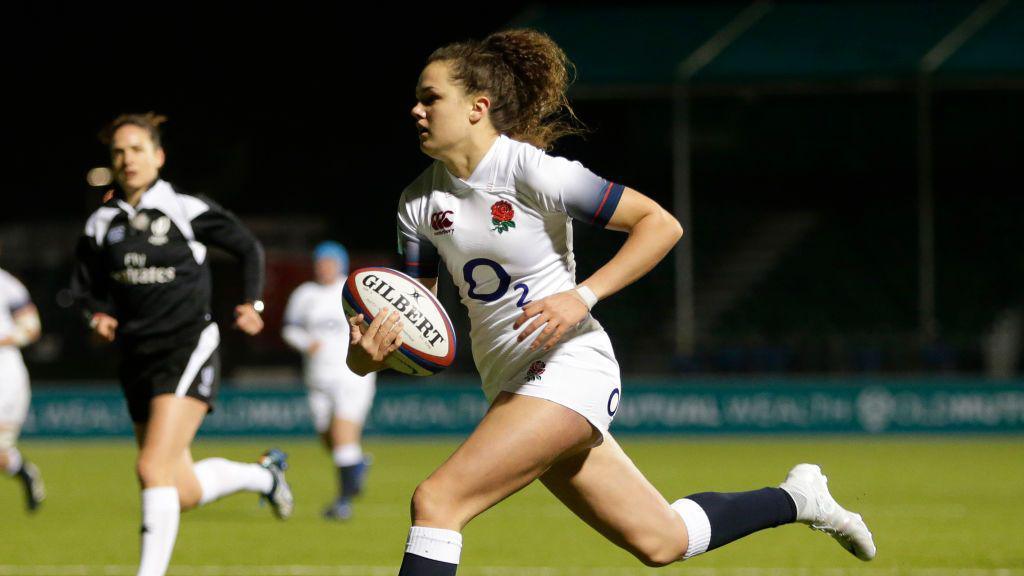 Getty Images
Getty Images“This route has tolls, includes a car transporter train, crosses through France and ends in a different time zone.”
Plot a road trip from London to Monaco, and the online journey planner spits out plenty of warnings. Chief among them is the estimate that it will involve more than 15 hours at the wheel.
In November last year, though, it was a drive Kildunne was contemplating.
Her scheduled flight to World Rugby’s annual awards ceremony in Monaco, where she was on the shortlist for world player of the year, had been cancelled.
Instead of sharing the snacks and satnav duties, though, she and her partner ended up hitching a lift on a private charter flight laid on for southern hemisphere players involved in the autumn internationals.
“It was honestly the most wild thing ever,” she said. “I took loads of videos to show Mum and Dad.
“[South Africa wing] Cheslin Kolbe was a couple of seats behind me.
“Alun Wyn Jones looked like a big man in a very, very small plane.
“And then when I got to the awards there were so many people I wanted to speak to, I was fangirling massively.”
Kildunne, who scored 14 tries in nine Tests for the Red Roses in 2024, walked away with the award that night.
And now, she is the focus of the fandom.
 Getty Images
Getty ImagesAt every England match at this Women’s Rugby World Cup, her name has been cheered loudest when the teams are announced.
When the match begins and she gets her hands on the ball, a bubbling mix of anticipation and excitement fills the stands.
There are more signs, T-shirts and general love for her than anyone else.
Her talent is exceptional, but also obvious.
While the finer points of Botterman’s breakdown work or Meg Jones’ defence are harder to appreciate, Kildunne’s ability with ball in hand needs no context or explanation.
She is a supremely balanced runner with a galloping stride, a silken swerve and the daring to put them to use on the biggest stage.
Twice in the semi-final win, she sliced France clean open for outstanding individual scores.
But there is more to her popularity than that.
She has struck a chord off the pitch.
Women’s Rugby World Cup final: England v Canada
Saturday, 27 September at 16:00 BST
Allianz Stadium, Twickenham
Live on BBC One, BBC Radio 5 Live and the BBC Sport website and app
Kildunne has a motto. She has it in frames on her walls and on the lock screen on her phone.
She alluded to it in a social media post celebrating her world player of the year award win, finishing her message with “lukewarm is no good”.
They are words written by author Roald Dahl and the full quote runs: “If you are interested in something, no matter what it is, go at it at full speed ahead. Embrace it with both arms, hug it, love it and above all become passionate about it. Lukewarm is no good.”
Kildunne has stuck close to that advice.
She is passionate about her past.
“I’m a very proud Yorkshire woman,” she said on the eve of the tournament.
“It’s important to be strong to your values and to remember who you are and where you’ve come from because that’s the person that’s got you here.
“It’s not all the showbiz and the lights and the cameras, it’s that young girl that picked up a rugby ball.”
She is passionate about her present.
“I just love what I do and the people that I’m around on my team. I’m grateful to be part of it,” she says.
But she is also unapologetically ambitious about what’s next.
Her side projects include photography (she has been pitchside taking shots at England men’s internationals), fashion (she designed a campaigning clothing collection) and podcasting (she and Breach launched Rugby Rodeo 12 months ago).
She packed deliberately lightly for the tournament so she could piece together vintage outfits from local second-hand shops as the team moved around England. She brought a second-hand keyboard into the pre-tournament training camp in the hope of learning piano.
She also has a string of commercial deals, appearing in bespoke cheetah print boots in the semi-final win over France and big-screen adverts for the tournament’s official beer.
It is an enthusiasm and energy that is difficult to resist.
Since the start of this year, the source of some of it has become clear.
Kildunne was diagnosed with ADHD (attention deficit hyperactivity disorder) – a neurodevelopmental condition that can lead to hyperactivity and impulsiveness.
“I was struggling to sleep at times,” she told GQ.
“My brain was working really fast or I wasn’t quite able to verbalise something that I’d seen on the pitch, so I was frustrated with myself.
“I had a conversation with Mum and Dad about my diagnosis. They said ‘it’s you, you’re creative, you go from one thing to another and that’s what’s made you’.
“I definitely think it’s a superpower – I’ve got the ability to focus on many things at once, but also hyper focus on the things that matter. And that’s definitely what has made me the player and person I am.”
And on Saturday, she may become a world champion, healing the pain of defeat in the 2022 final which she described as “my first real rugby heartbreak”.
Inevitably though, she also has other goals.
“The biggest thing for me is staying tight with the girls,” she said more than a month ago, as the tournament stretched out before her.
“These will be the things that we talk about in years to come when we are old ladies sat around a pool somewhere sunny together. Those are the moments we will reflect on.”
From the Keighley Queens to queens of the world?
Whatever destination this tournament arrives at for Kildunne and England, she is determined to have enjoyed the ride.
Related topics
-
Culture3 days ago
Taylor Swift’s new cinema outing generates more than €12million in just 24 hours
-
Politics3 days ago
European Parliament snubs Orbán with vote to shield Italian MEP from Hungarian arrest
-
Health4 days ago
EU renews support for WHO’s Universal Health Coverage Partnership
-
Culture3 weeks ago
Life, loss, fame & family – the IFI Documentary Festival in focus
-
Environment6 days ago
Key oceans treaty crosses threshold to come into force
-
Culture3 days ago
Twilight at 20: the many afterlives of Stephenie Meyer’s vampires
-
Culture2 months ago
Fatal, flashy and indecent – the movies of Adrian Lyne revisited
-
Culture1 week ago
Farewell, Sundance – how Robert Redford changed cinema forever


